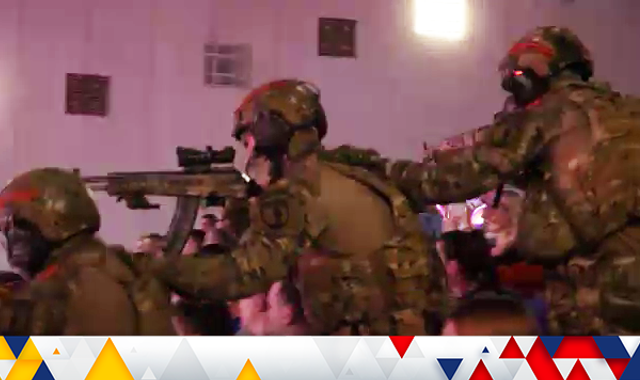'Pure truth': How Russia depicts its fight in Ukraine

In the dressing room, the actors pull on khaki balaclavas and strap down the velcro on their flak jackets.
There is the click of bullets being loaded into magazines though these are blanks.
The "Z" sign is everywhere.
Ukrainian traitor 'exposed' by police - war latest
This would be most Ukrainians' worst nightmare.
Here in Russia, it's a night on the town.
See how Russia depicts its fight in Ukraine and you will understand why no amount of battlefield setbacks will dramatically alter the way people perceive this war.
It is groupthink now.
Those who dared to think differently have left or are so quiet their voices are barely heard.
The general public going about their day to day don't stand a chance against narratives laid on this thick.
The play is called Polite People, the Russian moniker for the so-called "little green men", who took over and illegally annexed Crimea in 2014.
The actors are from a troupe called the Novorossiya Ensemble, affiliated with a regiment in the Luhansk People's Republic.
The storyline, as told through immersive theatre, video and blaring rock is a wild tale of bio-labs, drug-addled Ukrainian Nazis, big bad Americans and Russian heroism, some of it shot on location in Donbas.
"This is what we saw with our own eyes," said Roman Razum, who plays the lead role.
"This is what we went through, my friends and colleagues. It is the pure truth."
For Razum, the past eight years have been a tale of horror wrought by the Ukrainian army, under the direction of the CIA, on the people of Donbas.
There is not the slightest flicker of doubt in his eyes that things might not be so black and white.
"The definition of Ukraine was created to destroy Russia," he said.
"Today in this show we told you about the operation 'Aerodynamic' which the CIA and Pentagon developed to provoke our two peoples and to destroy Russia in general. Now we see the fruits of this operation."
Operation "Aerodynamic" was a post-war CIA programme developed to foster ties with Ukrainian nationalists who opposed the Soviet Union.
It is long since wound down but forms a convenient conspiratorial bedrock for the many Russians who, like Vladimir Putin, are convinced that all evil begins with the CIA.
We've come to watch the play in the town of Vladimir, a few hours east of Moscow.
The audience are in large part local military or security forces - young cadets, local police and Rosgvardiya, the National Guard.
Rosgvardiya's cultural wing (yes, they have one) and the local administration are in charge of distributing the invitations.
The presidential fund of cultural initiatives provided the grant.
Next stop on the tour is the nearby military training ground in Kovrov where men mobilised in the Vladimir region go to train.
If you have barely any training and inadequate kit, belief in your cause is one of the few weapons you have.
The audience seem enthralled.
A standing ovation greets Razum's final words: "Victory will be ours."
I ask him about Ukraine's recapture of the southern city of Kherson, where Russian troops were forced to retreat.
'"This is all temporary. We will definitely come back," he said.
"The country's military leadership knows the situation better and knows what to do."
Audience members pose with him in front of the "Polite People" billboard.
One of them, a strapping man called Volodya, says he was delighted with the performance.
He said: "I'm a veteran of the military action in the North Caucasus. I already went through this back then."
Would he serve in Ukraine?
"If the motherland calls, I'll go. I've already packed my bag," he said.
Since mobilisation, regular video appeals appear and circulate online of wives and relatives begging for better support for those called up.
Several have been from the Vladimir region.
In the latest, a group of women beg Mr Putin to deal with the "mayhem".
"No one has the right to send mobilised to the frontline without weapons or training. This is against the law," they argue.
Read more on the Ukraine war:
'Conflict will be over by the end of spring', Ukraine's deputy defence minister predicts
British former running coach races into liberated villages to rescue civilians
Getting any of them to talk to Western media though, is a different story.
It is partly fear, the laws around discrediting the armed forces are well-known by now.
But it is mostly suspicion.
We are still the enemy and they are still patriots, even if their boys don't have adequate weapons or training.
Click to subscribe to Ukraine War Diaries wherever you get your podcasts
Nine months since this invasion, if anything attitudes have hardened, reinforced by the latest setbacks and the terrible loss of life.
There seems to be a sense that if the Russian people must make these sacrifices, it must be for a reason.
And it will be a message passed on down the generations, that Russia's cause is noble, that Russians did no wrong.
A little boy stares at the billboard for the show and does his best to pronounce "Ve-Zhli-Vi-Ye", the Russian word for polite.
"Why are they called that?" he asked his mother.
"Because they are polite," she said.

 Yahoo News
Yahoo News 